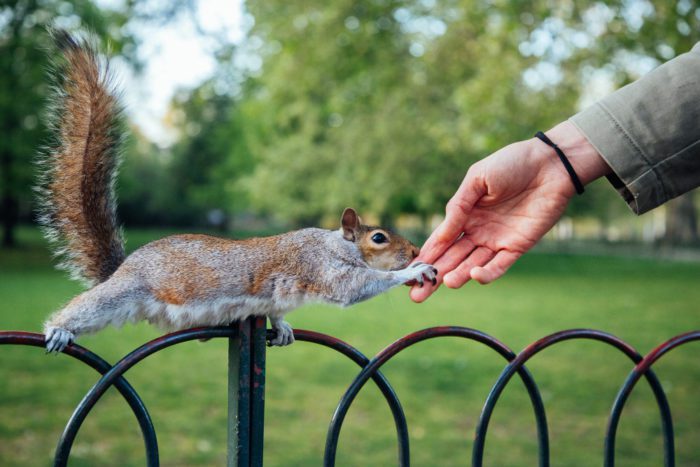It was last summer. On my first step on the terrace, I was greeted by a painful sensation on my left little toe. I looked down and saw a squirrel scampering away. It had bitten me. Probably because I was too careless to notice it and almost stepped on it. Duh.
So, are you as careless as me? Or are you an animal lover who was bitten by one of those cute furry rodents? Are you anxious about the consequences of squirrel bites?
Well, you are at the right place.
Important Note: If you're tired of pests and want a reliable solution, then you should definitely consider seeking help from a professional pest control company. DIY solutions can be effective, but if you're dealing with a significant pest infestation, you don't want to rely solely on DIY methods. Pest control companies typically don't charge huge fees. You can fill out this form to receive free quotes from the top local pest control companies, and compare the quotes and see for yourself. Then, finally, your pest problems will be eliminated for good.
To know why squirrels bite, some prospective diseases caused by their bites, and treatments for squirrel bites, read ahead!
Do Squirrels Bite?
The simple answer to this is, normally, squirrels do not bite humans. They are not aggressive species. But like all wild animals, if they feel threatened, they tend to lash out.
This lash-out triggers their biting instinct. Squirrels in the wild are more bitters, but even domesticated or pet squirrels are prone to bite if provoked.
They can feel unsafe due to the presence of some larger animals, or even humans around. The bite of squirrels is a defense mechanism that they use to protect themselves.
It is also sometimes accidental biting on their part when trying to eat from your hand.
Is Squirrel Bite harmful to humans?
Yes, squirrel bites can be harmful to humans. If you are bitten by a squirrel, it is important to clean the wound immediately and seek medical attention. Squirrel bites can cause infections, so it is important to make sure that the wound is properly cleaned and treated. Squirrel bites can lead to necrotizing fasciitis.
What do I do if a Squirrel bites me?
If a squirrel bites you, the first thing you should do is wash the wound with soap and water. Disinfect the area with rubbing alcohol. You should then see a doctor or go to the emergency room, especially if the bite is on your face or if it breaks the skin. If you are up-to-date on your tetanus shot, you will likely just need to watch for infection. If you have not had a tetanus shot in the past 10 years, you will need to get one.
Does Squirrel Bite cause rabies
Rabies is a serious viral infection that attacks the central nervous system and is almost always fatal once symptoms develop. The virus is most commonly transmitted through the bite of an infected animal, such as a squirrel. While rabies is rare in squirrels, and according to the “Centers For Disease Control And Prevention” findings, humans are almost never found to be infected with rabies and have not been known to transmit rabies to humans. So the answer to your question can squirrel bites cause rabies? Most likely No. But squirrels infected with rabies can.
Possible After-Effects of Squirrel Bite
Some immediate effects of squirrel bites include:
- Headache
- Nausea
- Fever
- Muscle aches
Some Diseases Caused by Squirrel Bites
Rabies
Squirrels are unlikely to be infected with rabies. But there have been rare cases where squirrel bites cause rabies virus transmission to humans. Though they suffer from a fatal roundworm brain parasite that causes symptoms similar to rabies.
Necrotizing Fasciitis
Squirrel bites can lead to necrotizing fasciitis. Its symptoms include painful and intensive swelling in the area of the bite. Studies have revealed that these wounds evolve by spreading the necrosis to a larger area around the bite.
Sometimes they are accompanied by bluish-red discoloration, pale spots, and hemorrhagic bullae.
Immediate doctor’s consultation is needed in this case.
Lymphocutaneous Sporotrichosis
A case study has revealed that this does not come with instant symptoms.
A 23-year-old man was bitten by a squirrel and took some erythromycin in the initial days. But after 45 days he noticed a worsening skin lesion. It expanded and ulcerated along with the development of similar lesions.
Tularemia
also known as “rabbit fever,” this disease is caused by the bacteria Francisella tularensis. It can lead to fever, skin lesions, and death in humans if left untreated.
Leptospirosis
this bacterial infection is transmitted through contact with contaminated water or soil. It can cause high fever, muscle pain, vomiting, and jaundice in humans.

Ways to Treat Squirrel Bite Wounds
First, you have to understand if the bite is too deep or not. But in any case, the most important step in any animal bite wound is disinfecting the area.
Steps to proceed with first aid in case of squirrel bites:
- Wash the bite thoroughly with soap and water solution. The water should be warm and the cleaning should be done gently.
- Disinfect the area with rubbing alcohol or some other disinfectant. Rubbing alcohol is known to be too harsh on the skin, but you can never be too careful when it comes to animal bites. So you can try it out.
- Apply some antibiotic ointment on it.
- Wrap a clean gauze with a little bit of cotton under it. If the wound is small then a mere band-aid will do the job.
- Keep the wound covered till it starts to heal.
When to See a Doctor in Case of Squirrel Bites
If squirrel bites are accompanied by these symptoms then you should immediately visit a doctor:
- Leakage of pus
- If swelling expands to a larger area around the wound
- If fluid oozes out
- Warmth around the bitten area
- Some red streaks extending away from the bite
Why is medical attention necessary?
- Sometimes after the bite, if the squirrel has weak teeth, it might break off and get embedded in your wound
- The gnawing teeth of squirrels might lead to some tissue or nerve damage
- The bite might lead to some infection, bacterial or rabies kind
- Some alien substance from the squirrel’s mouth might get stuck in your wound
- Generally, squirrels do not transmit any disease to humans. But sometimes they might, so immediate diagnosis is needed to understand the infection and start treatment
Probable Diagnosis by Doctors
- Examination: With the application of anesthesia the area is numbed and then your wound might be examined for foreign particles.
- X-ray: X Rays might be needed to scan for any foreign substance inside the wound which might get missed in initial checks.
- Cleaning the bitten area professionally.
- Removing unwanted debris from the wounds.
- Sometimes dead or infected tissues might need to be removed. This can be painful.
- Usually, stitches are not for puncture wounds. But sometimes that, along with sutures, might be also done to close the bite.
- Sometimes you might also need a tetanus shot.
How to Avoid Squirrel Bites
- Try not to feed them from your hands. Even if you do, try and use some thick gloves
- Do not provoke them with threatening objects
- Do not engage them in aggressive behavior
- Try to avoid going near baby squirrels in presence of adult ones
- Try to not handle squirrels who appear sick with bare hands.

Final Words
Squirrels are naturally skittish. They will very rarely come near you or let you feed them unless it is your pet squirrel.
So you do not need to fear squirrels. But like every other animal, sickness and protective instincts can make these furry creatures aggressive and bitey.
Squirrel bites are not that dangerous unless you have the above-mentioned effects. Even then it is easily treated. So get treated by a medical professional in case of a squirrel bite.
Hope this article could alleviate your anxiety!

